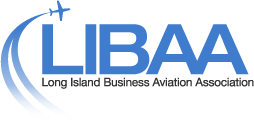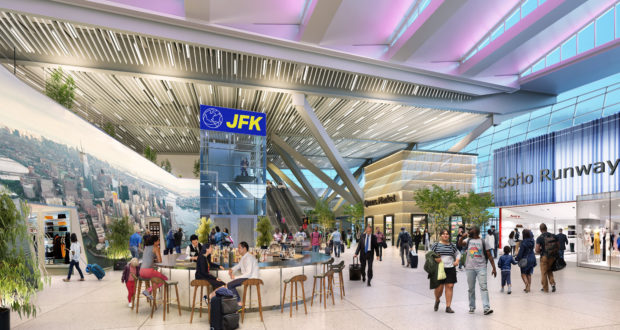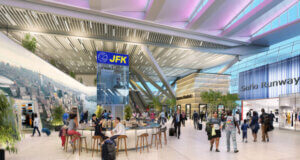The plan for a new $9.5 billion, $2.4 million square-foot terminal at John F. Kennedy International Airport will bring 10,000 jobs – including 6,000 union construction jobs – and scores of opportunities for local and minority and women-owned businesses, state officials said Monday.
Gov. Kathy Hochul said the New Terminal One will anchor the south side of the airport. The project will be built in phases, serving as part of complete transformation of the airport.
A revised agreement with the Port Authority of New York and New Jersey was reached Monday with a consortium of financial sponsors, also known was The New Terminal One, Hochul said.
“As we recover from this pandemic, I want to ensure that everyone traveling to New York has a welcoming and streamlined experience, and that New Yorkers have the modernized transportation hubs they deserve,” Hochul said in a statement. “The time to get large infrastructure projects done is now, and I’m committed to getting JFK’s brand new Terminal One underway and completed as soon as possible.”
The Port Authority Board of Commissioners are expected to vote on the proposed lease agreement Thursday. The full cost of the terminal will be privately financed by the NTO consortium, which includes financial partners Carlyle, JLC Infrastructure – a minority-owned equity investor – and Ullico. A joint venture of Munich Airport International and CAG Holdings is the operating and technical services partner to the consortium.
As part of the project, the Port Authority will undertake infrastructure upgrades and improvements including roads, parking, and utilities including a new electrical substation.
The New Terminal One will be built on the sites of the “current undersized and outdated Terminal 1, the aging and obsolete 59-year-old Terminal 2, and the site of the former Terminal 3, which was demolished in 2013,” according to a news release about the project. Construction is expected to begin in mid-2022 and the first phase, including the new arrivals and departures hall and first set of new gates, is expected to open in 2026.
Initially scheduled to break ground in 2020, the project was put on hold amid COVID-19 and its travel restrictions, and officials said that terms of the agreement needed restructuring. This includes an extended lease term to 2060 to provide sufficient time after the terminal opens to enable the private investors recover their multi-billion-dollar investments. The City of New York’s 10-year emergency extension of the master lease for JFK Airport, which was set to expire in 2050, enabled this element of the restructured deal.
The project should be fully completed in approximately 2030. It will feature 23 new gates, bright and airy check-in halls and arrival spaces designed to enhance the traveler’s experience, in line with highly-rated terminals across the globe. There will be New-York inspired dining and retailers, lounges, an indoor green and family-friendly amenities. It will also deploy the latest advances in both sustainability and security, while bringing a New York sense of place, including through the works of local artists Taste NY stores.
The passenger facilities will feature significantly larger check-in and security as well as free high-speed wifi. They will also include touchless passenger journey, digital passenger flow and queue management, TSA security lanes featuring the latest technology, advanced video search analytics, biometric-based systems and a flexible design to accommodate future technology and/or regulatory changes.
Sustainability enhancements will include the use of renewable energy technologies such as a solar hot water, aircraft de-icing and fluid recovery, and the conversion of diesel ground service equipment to electric-powered ground service fleet across the airport – such as baggage tractors and belt loaders.
The airport supports about 300,000 jobs that pay $16.2 billion in wages annually while generating $45.7 billion in yearly sales. Prior to the onset of the pandemic, the airport set a record with 62.6 million passengers in 2019.
JFK Redevelopment Community Advisory Council was formed in 2018, comprising elected officials, community boards, business and nonprofit organizations, civic organizations, and clergy leaders from the targeted local communities, including in western portions of Nassau County. The council works with the Port Authority to expand outreach opportunities, including with local businesses, MWBEs, and jobseekers.
The council aims to advance the Port Authority’s commitment to a 30 percent MWBE contracting goal in all categories of work, and a special focus on opportunities for local businesses across all aspects of the JFK Redevelopment program, including this terminal project, which will be built by union labor under a full project-labor agreement. Other community development initiatives prioritized by the council focus on job opportunities and workforce development programs, small business outreach and development, and educational programming for students.
The JFK Redevelopment Community Information Center opened in Jamaica in early 2019, aiming to provide easier access for firms looking for business opportunities, local residents in search of jobs, or neighbors seeking more information about the project.
“With the support of Gov. Hochul and the Port Authority, we will deliver a world-class terminal, drive New York State’s nation-leading MWBE participation to new heights and help spur regional economic growth,” Gerrard Bushell, executive chair of The New Terminal One, said in a statement. “We will also deliver on our multi-year commitment to community development in Southeast Queens, and an increase in the number of local jobs, educational programs and small business capacity building.”
“As co-chair of the JFK Redevelopment Community Advisory Council, it’s been a pleasure working with the Port Authority to create thousands of jobs that benefit MWBEs and locally based enterprises,” Rep. Gregory Meeks said in a statement.
The private consortium NTO comprised of Carlyle, JLC Infrastructure (formed in 2015 by Loop Capital and Magic Johnson Enterprises), and Ullico (the only labor-owned insurance and investment company), and is supported by Reach Airports, a joint venture between Munich Airport International and Carlyle’s airport platform, CAG Holdings, providing technical services. NTO selected a design build team, led by AECOM Tishman, and Gensler, a design and architecture firm.


 By:
By: 